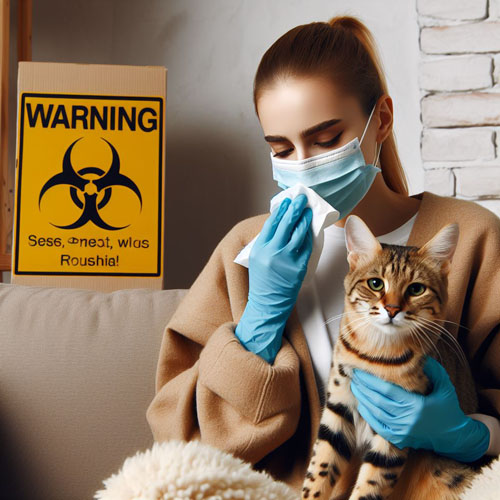Are Savannah Cats really hypoallergenic
Many people have asked me this question in the past. Some breeders claim that Savannah’s are hypoallergenic, and if we go by the bona fide definition of hypoallergenic, I would agree.
hy·po·al·ler·gen·ic
/ˌhīpōˌalərˈjenik/
adjective: hypo-allergenic
However, most people interpret hypoallergenic as meaning they won’t have any allergic reactions to Savannah cats, which is not always the case. Some people are still affected to the allergies caused by Savannahs.
So, what exactly are people allergic to? Cat allergies can be caused by various factors. Fur or hair, skin cells, saliva, and urine all contain a specific protein called Fel d 1, which some people are allergic to. Research shows that all cats have this protein, so it’s not possible for any cat to be completely hypoallergenic.
Different Levels of Allergies: When it comes to allergies caused by domestic cats, there are varying degrees of reactions. Some cat lovers might just have a minor watery eye or minor nasal drip after cuddling with a cat, while others might swell up like a balloon soon after entering being around a cat.
The same applies to Savannah cats. A person might have very minor or be nonreactive to Savannahs, while other people may experience the same allergic symptoms as they would with a regular domestic cat. A friend of mine is a prime example. She is very allergic to cats, and whenever she visits my home, I have many Savannahs, she starts experiencing running eyes, a runny nose, itchy eyes, and a scratchy throat soon after visiting. On the other hand, I’ve had people with cat allergies intentionally pet a Savannah and then rub their face multiple times with no reaction whatsoever. Unfortunately, these situations make it challenging for for any breeder to advise potential buyers on the hypoallergenic or allergic reactions they might have to a Savannah Cat.
Are all generations of Savannahs the same? I do suspect the dander/proteins of a higher generation Savannahs are somehow different from those of regular domestic cats. Based on my years of research, only a small handful of people react to F1 and F2 Savannahs. Definitely, something to consider if you are allergic to cats and are thinking of adding a Savannah to your family.
It’s important to visit a breeder before investing in a Savannah cat. It is easy to find a breeder as each state has many, making it easier to make a day trip and interact with kittens in person to ensure there is no allergic reaction.
Living with pet allergies can be tough, but there are ways to lessen daily reactions. Good pet hygiene and housekeeping practices are key. Wet wiping your cat daily to remove dried saliva and brushing them to remove shedding hair can greatly reduce allergic reactions. Vacuuming furniture is also important, as cats tend to camp out on it and leave behind dander. For those with more bothersome allergies, keeping bedroom doors closed can prevent dander from spreading onto bedding and pillows.





